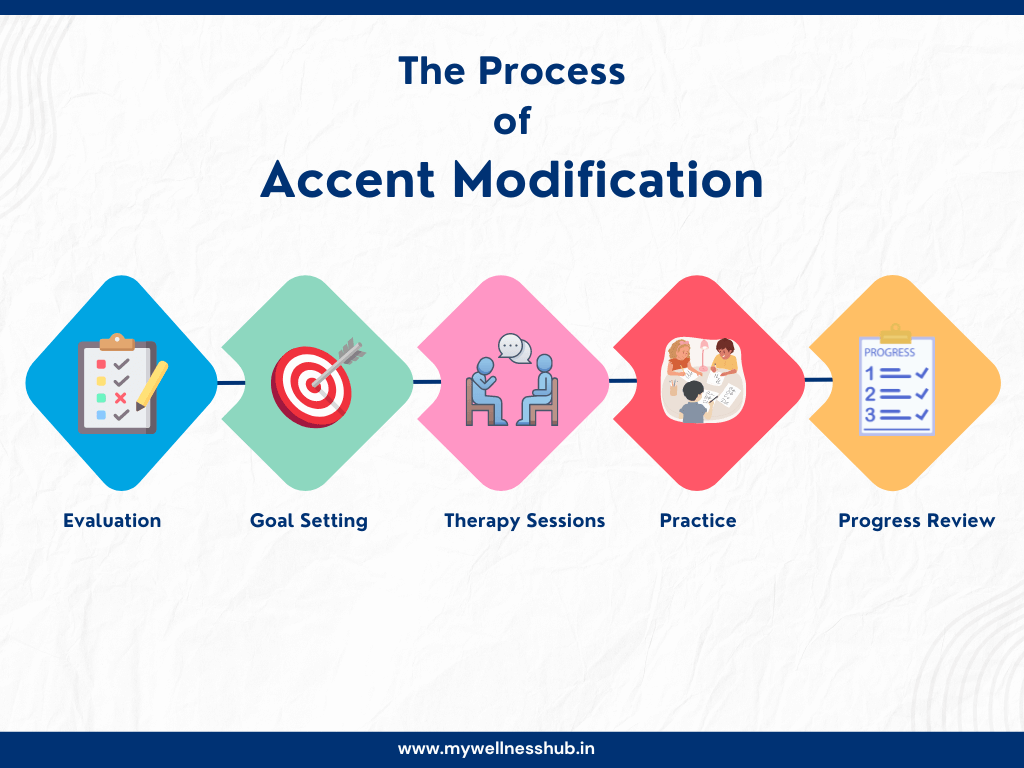Speak Clearly & Be Understood: Easy Accent Reduction Tips
By Rajini D
Last Updated: April 25, 2024
Everyone has an accent, and it’s as unique as a fingerprint. Accents show a lot about a person’s background, culture, and experiences. They can even tell stories about where we’ve come from and who we’ve met. While accents are a part of who we are and something to be proud of, they can sometimes make it hard to communicate clearly, especially in today’s globally connected world.
Have you ever thought about how changing your accent might help you communicate better? Whether you want to grow professionally, connect better socially, or just express yourself more clearly, learning some speech therapy techniques to modify your accent could help. This doesn’t mean you’re changing who you are. Instead, it’s about improving the way you connect with others.
Also read: Master Clear Communication: Your Guide to Accent Reduction
Understanding Accents
What is an Accent?
An accent is not just about how we pronounce certain sounds like “Rs” and “Ts.” It involves a mix of features, including how we pronounce words, the rhythm of how we talk, and the tone of our voice. These features are influenced by where we grow up, the culture around us, and the languages we learn. For example, the musical sound of Italian or the distinct rhythm of Indian English each tells something about a person’s background and heritage.
Common Reasons for Wanting to Modify an Accent
People pursue accent modification for various reasons, all of which are valid and significant. Here are a few common motivations:
- Professional Advancement: In a world where business is done globally, it’s very important to speak clearly. Many people work on their accents to avoid confusion and to sound more like their colleagues from English-speaking countries. This is especially helpful during presentations, meetings, and when talking to customers.
- Social Interactions: Having conversations can be more enjoyable when everyone understands each other easily. If you reduce a strong accent, you might not have to repeat yourself as much, and people will understand you better. This can make you feel more confident when talking to others.
- Personal Confidence: Sometimes, if you have a strong accent, you might feel self-conscious, especially in places where your accent is different from others. Working on reducing your accent can boost your self-esteem and help you feel more comfortable in various situations.
How Speech Therapy Can Assist in Accent Reduction

Role of Speech-Language Pathologists (SLPs)
Speech-Language Pathologists (SLPs), also known as speech therapists, are key in helping people change their accents. These experts know a lot about how we make sounds and speak, which helps them understand how different accents are formed. By working with you, speech therapists can figure out the exact parts of your speech that make up your accent. They can then help you adjust these to make your speaking clearer.
Key Techniques Used in Speech Therapy for Accent Reduction
- Phonetic Training: This technique involves learning to recognize and produce the sounds of a language that may not be present in your native tongue. SLPs will guide you through exercises that focus on articulation, helping you adjust how you form sounds with your mouth.
- Minimal Pair Drills: These are exercises where two words that differ by only one sound (like “ship” and “sheep”) are practiced. This helps you learn to hear and produce the subtle differences between sounds in English, which can be crucial for effective communication.
- Auditory Discrimination: This involves training your ear to hear subtle differences in sounds. It’s crucial for understanding and being understood by others, especially in a language that isn’t your first.
Common Techniques Used in Speech Therapy for Accent Reduction
| Technique | Description | Benefits |
|---|---|---|
| Phonetic Training | This involves teaching the individual the correct articulation and sounds of a language, focusing on how to place the tongue, lips, and jaw for proper pronunciation. | Improves pronunciation accuracy and makes speech clearer to listeners. |
| Minimal Pair Drills | Uses pairs of words that differ by only one phonological element to teach the subtle sound distinctions in a language (e.g., “ship” vs. “sheep”). | Helps individuals distinguish between similar sounds, reducing misunderstandings. |
| Auditory Discrimination | Focuses on training individuals to hear and differentiate sounds that are not native to them, improving their ability to understand and produce these sounds accurately. | Enhances listening skills and the ability to distinguish between subtle sound variations in speech. |
Learn more about speech therapy techniques at home
Benefits of Accent Modification

Engaging in accent modification through speech therapy not only refines your pronunciation but also brings a multitude of benefits that can enhance various aspects of your life. Here’s how focusing on improving your accent can help:
Improved Communication in Diverse Settings
Whether you’re participating in international conferences, attending social gatherings, or interacting in multicultural environments, accent modification can significantly improve your ability to communicate effectively. Clear speech ensures that your ideas and thoughts are conveyed accurately, reducing misunderstandings and fostering better interactions across different settings.
Increased Confidence in Personal and Professional Life
Accent modification often leads to a boost in self-esteem. Knowing that you can be easily understood in conversations eliminates the worry of being misinterpreted due to your accent. This newfound confidence can transform your personal interactions and open doors in your professional endeavors, making you more assertive and willing to engage in discussions or public speaking opportunities.
Enhanced Comprehension and Pronunciation of English
Through techniques learned in speech therapy, such as phonetic training and minimal pair drills, you’ll not only improve how you pronounce English but also your ability to understand others. This dual enhancement aids in smoother conversations and deeper connections, particularly in environments where clear communication is crucial.
Getting Started with Accent Reduction
Initial Evaluation by a Speech Therapist
If you’re considering accent reduction, your first step will be an initial evaluation with a speech therapist. This initial session is crucial as it sets the foundation for your accent modification journey. Here’s what you can expect during your first visit:
- Assessment of Your Speech and Accent: During your first meeting, the speech therapist will listen to you speak or read aloud. This helps them understand the unique sounds and rhythms of your speech. Identifying these details is crucial for knowing how to help you.
- Discussion of Your Goals and Concerns: You’ll also talk about why you want to work on your accent and any specific areas you think need improvement. This conversation is important because it lets the therapist customize the therapy to fit exactly what you need.
- Language History and Usage: Finally, you’ll go over your language history. This includes the languages you speak, how and where you learned them, and how you use English in your everyday life. This information gives the therapist a full picture of your language use, which is essential for effective therapy.
Read more: Improve Your Speech: Effective Accent Modification Therapy
Conclusion
Accent modification is not just about changing how you speak; it’s about improving your ability to express yourself clearly and effectively. Whether you’re aiming for professional growth, better social interactions, or increased personal confidence, adjusting your accent can greatly enhance how you connect with others. It allows you to share your identity more clearly without losing the essence of who you are.
For those ready to take the next step, Wellness Hub provides a range of resources and expert advice to support you. Our Communication Enhancement section is filled with helpful articles, tips, and strategies designed to help you refine your speech and accent. Visit us to learn more about how you can improve your communication skills and ensure your voice is heard just as you intend.
Frequently Asked Questions:
1. What is accent modification in speech therapy?
Accent modification, or accent reduction, involves speech therapy techniques designed to help individuals change or reduce their accents to improve clarity and effectiveness in communication. It focuses on altering pronunciation, rhythm, and intonation in speech.
2. How does a speech therapist help with accent reduction?
A speech therapist, or Speech-Language Pathologist (SLP), works with individuals to identify specific speech patterns that characterize their accents. Targeted exercises like phonetic training and minimal pair drills help modify these patterns to enhance clarity and intelligibility.
3. Can speech therapy completely eliminate my accent?
Speech therapy aims to enhance your communication by increasing your speech clarity, not necessarily to completely eliminate your accent. The goal is to make your accent less of a barrier to effective communication rather than removing it entirely.
4. How long does it take to see results from accent modification therapy?
The time it takes to see results from accent modification therapy can vary depending on the individual’s commitment to the therapy sessions and practice, the frequency of therapy, and the specific goals set by the therapist and the client. Typically, noticeable improvements can be seen within a few months.
5. Is accent modification right for everyone?
Accent modification is suitable for anyone looking to improve their spoken communication for professional or personal reasons. It is particularly beneficial for non-native speakers, professionals working in an English-speaking environment, or individuals looking to enhance social interactions.
6. What are some common techniques used in speech therapy for accent reduction?
Common techniques include phonetic training to adjust sound production, minimal pair drills to refine sound differentiation, auditory discrimination to improve sound recognition, and various articulation exercises to practice new speech patterns.
7. Where can I find a qualified speech therapist for accent modification?
You can find qualified speech therapists through local clinics, hospitals, university clinics, and online platforms that offer specialized services in accent modification. Always ensure they are certified speech-language pathologists with experience in accent training.
8. What should I expect during my first accent modification session?
In your first session, the speech therapist will assess your speech patterns and accent through conversations and reading exercises. They’ll discuss your goals for accent modification and gather information about your language history, such as your native language and any other languages you speak. This initial assessment helps the therapist create a personalized treatment plan.
9. Can accent reduction help in professional settings?
Yes, accent reduction can be highly beneficial in professional settings. It can enhance your ability to communicate effectively with colleagues and clients, reduce misunderstandings, and improve your overall professional image. Clear communication is crucial in global business environments, making accent reduction valuable for career advancement.
10. Are there online options for accent modification therapy?
Yes, many speech therapists offer online accent modification therapy sessions. Online therapy provides the convenience of participating from home and often offers more flexibility in scheduling. It’s an effective alternative to in-person sessions, especially for those with busy schedules or limited access to local speech therapy services.
About the Author:
Rajini Darugupally
M.Sc., Speech-Language Pathologist (9+ years of experience)
Rajini is a passionate and dedicated Speech-Language Pathologist with over 9+ years of experience, specializing in both developmental speech and language disorders in children and rehabilitation in adults. Driven by a desire to empower each individual to find their voice, Rajini brings a wealth of experience and a warm, genuine approach to therapy.
Currently, at Wellness Hub, she thrives in a team environment that values innovation, compassion, and achieving results for their clients.
Connect with Rajini to learn more about how she can help you or your loved one find their voice.
Book your Free Consultation Today
Parent/Caregiver Info:
Client’s Details:
* Error Message









